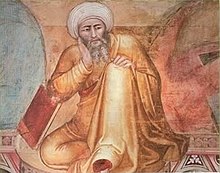
Back مفارقة القدرة المطلقة Arabic Daş paradoksu Azerbaijani Paradoks svemoći BS Paradoxa de l'omnipotència Catalan Allmachtsparadoxon German Παράδοξο της παντοδυναμίας Greek Paradokso de la ĉiopoveco Esperanto Paradoja de la omnipotencia Spanish Guztiahaltasunaren paradoxa Basque پارادوکس قدرت مطلق Persian
This article needs additional citations for verification. (March 2023) |

| Part of a series on the |
| Philosophy of religion |
|---|
| Philosophy of religion article index |
| Part of a series on |
| Atheism |
|---|
The omnipotence paradox is a family of paradoxes that arise with some understandings of the term omnipotent. The paradox arises, for example, if one assumes that an omnipotent being has no limits and is capable of realizing any outcome, even a logically contradictory one such as creating a square circle. Atheological arguments based on the omnipotence paradox are sometimes described as evidence for countering theism. Other possible resolutions to the paradox hinge on the definition of omnipotence applied and the nature of God regarding this application and whether omnipotence is directed toward God Himself or outward toward his external surroundings.
The omnipotence paradox has medieval origins, dating at least to the 10th century, when the Saadia Gaon responded to the question of whether God's omnipotence extended to logical absurdities.[1] It was later addressed by Averroes[2] and Thomas Aquinas.[3] Pseudo-Dionysius the Areopagite (before 532) has a predecessor version of the paradox, asking whether it is possible for God to "deny Himself".
The best-known version of the omnipotence paradox is the paradox of the stone: "Could God create a stone so heavy that even he could not lift it?" This is a paradoxical question because if God could create something he could not lift, then he would not be omnipotent. Similarly, if God was able to lift the stone then that would mean he was unable to create something he could not lift, leading to the same result. Alternative statements of the paradox include "If given the axioms of Euclidean geometry, can an omnipotent being create a triangle whose angles do not add up to 180 degrees?" and "Can God create a prison so secure that he cannot escape from it?".
- ^ "אמונות והדעות - בן ישראל, אשר (page 54 of 219)". hebrewbooks.org. Retrieved 2021-08-22.
- ^ Averroës, Tahafut al-Tahafut (The Incoherence of the Incoherence) trans. Simon Van Den Bergh, Luzac & Company 1969, sections 529–536
- ^ Aquinas, Thomas Summa Theologica Book 1 Question 25 article 3
© MMXXIII Rich X Search. We shall prevail. All rights reserved. Rich X Search